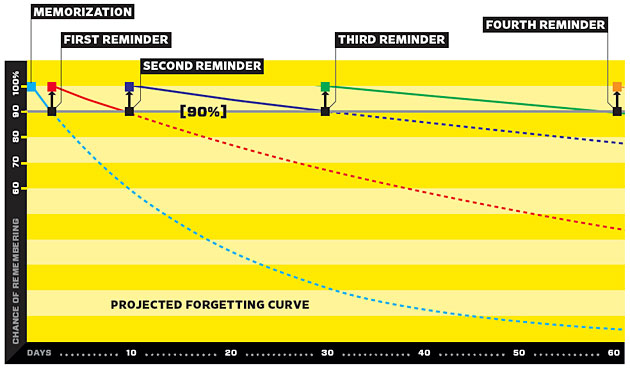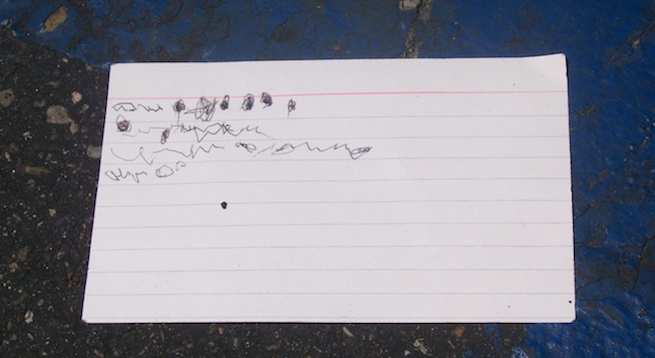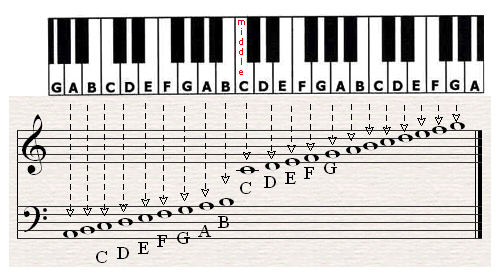
I love knowledge.
That may sound a little silly but it is entirely true. I love knowing things — from simple trivia to things that will actually have a directly beneficial impact on my life. I also love the idea of “hacking” ways to make learning quicker and easier.
For the past few weeks I have been learning the capital city of every country in the world. I have worked my way through Europe (easy), the Americas (not too bad), Asia (getting tough) and Africa (yikes) so far, with Australasia left to do. This is not something I would have endeavored to do were it not for a simple piece of open source software that makes learning exponentially easier. In this post I want to introduce you to this software and explain why it is so effective at helping you to learn more.
Spaced Repetition
I was first formally introduced to the concept of spaced repetition learning by Derek Sivers in this article: Memorizing a programming language using spaced repetition software. It’s a little heavy and you don’t need to read it if you don’t want to but the principle is pretty simple: the human brain is far better at remembering things through repeat exposure.
It’s the same reason why when you crammed for an exam in school, you’d forgotten most of what you had learned a week later. The key to retaining information is consistent exposure over an extended period of time — that is how it is transferred from your short term (temporary) memory to long term (permanent) memory.
You’ll have to forgive me for my layman’s approach to this as I am no scientist, but I’m sure you get the gist. Take a look at the following image from Derek’s post for a graphical representation of the phenomenon of spaced repetition learning:

As you can see, if you remind yourself of a piece of information regularly, the chance of you remembering it is drastically improved. I have experienced this firsthand and can attest to the incredible power of spaced repetition learning — the simple principle of exposing yourself to the same piece of information periodically so that it is eventually lodged within your long term memory.
Introducing Anki
Creating any kind of manual system that easily facilitates spaced repetition learning is a huge hassle, which is why I have come to love an open source piece of software known as Anki. You may be wondering what it does. Well, do you remember those flash cards you used to study for exams with?

Anki basically operates as a computerized flash card system — one of the key improvements being that depending on how well you know the answer to any given question contained on a flash card, Anki can determine when you next see it (be it in 10 minutes, a day, a year, or any other period of time).
I have used Anki over the past month or so learn a huge amount of capital cities that were previously unknown to me — personal favorites being Greenland (Nuuk), Myanmar (Naypyidaw) and Brunei (Bandar Seri Begawan). It only takes 5-10 minutes per day and is great fun. In the future I plan to use it to learn any number of things — from US presidents to the notes on the grand staff:

Anki is extremely easy to download and set up and is available completely free of charge for all major operating systems. If you run into any trouble there is extensive documentation available.
Boosting Your Learning Ability by Association
Anki is fantastic for dramatically boosting your memorization abilities but I have found that combining it with association has resulted in an even greater effect.
I’m not going to go into too much detail here as the concept has been covered in more depth and by better-qualified people than me but the idea is to associate any new thing you learn with a memorable image or fact. I have used this to memorize a huge number of capital cities. Here are three examples:
- The capital of Sudan is Khartoum: the association is “my brother used to lived there” (as his old house in London was on Khartoum Road).
- The Judicical capital of South Africa is Bloemfontein: I imagine a bunch of judges crowded around a fountain with flowers blooming out of the waters.
- The capital of The Gambia is Banjul: I imagine Gambian banjo players wearing huge jewelled necklaces.
If you can create these kind of associations and/or memorable images the chances of retention are vastly improved. I can attest to that — the capital cities that I can’t think of anything to associate with are far more difficult to remember than the rest.
What Memorization Tips Do You Have?
There you have it folks — a couple of key steps I have taken to vastly improving my ability to memorize things.
But what about you — do you have your own techniques? Or do you have suggestions that can help improve spaced repetition or association? Let us know in the comments section below!
Photo Credit: Andy King, JD Hancock and Piano Play It

saba
I am unable to learn anything and my finals are after 6 days
I don’t know what to do now
Zeeshan
Spaced Repetition definitely works. I have tired it and continue to use it for my learning purposes.
I wish I had discovered this technique when I was in High School. It would have made life so much easier.
The key is to persistently review when time comes and not skip the scheduled reviews. Do that and you can learn anything.
Tom
Thanks Zeeshan!
ウエディングドレス
ウエディングドレス
Ricky
I’m trying Anki for learning “detailed” stuff. For more “general” items (e.g., notes from podcasts, books) that I want to remind myself of periodically, I’m trying http://www.learnglue.com.
You can send an email with your notes, and it sends them back using spaced repetition (next day, 1 week, 1 months, etc.)
Tom Ewer
Very cool Ricky. Nice suggestion — thanks!
jimkitz
Great article, Tom. I’m going to download and use Anki.
There is a cornucopia of great learning techniques at Win Wenger’s Project Renaissance. http://winwenger.com/edtech.htm
Jim
Tom Ewer
Interesting — thanks!
Shawn
I use 7±2.
Repeat something mentally or audibly between 5 and 9 times and you’ll remember it. Some require more repetition, others less. I learned this in Psychology class some 20+ years ago and have used it since to remember everything from code to phone numbers, names and all sorts of other stuff.